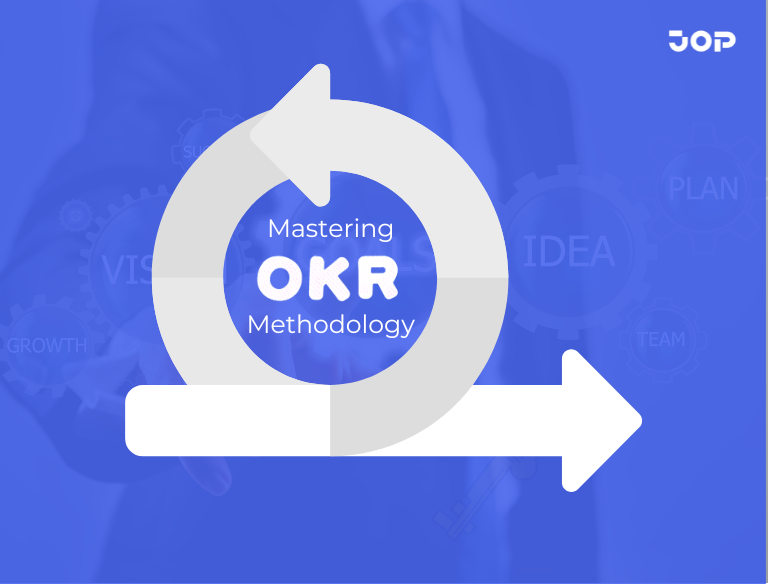In today’s fast-paced and ever-changing business landscape, setting and achieving goals is crucial for success. Objectives and Key Results, or the OKR methodology in 2023, is a powerful approach that helps organizations define and achieve their objectives. It’s a structured framework for goal setting, monitoring progress, and adjusting as needed.
The OKRs methodology has gained immense popularity recently as a powerful goal-setting framework that helps organizations and individuals stay focused, align their efforts, and drive growth.
In 2023, mastering the OKR methodology has become more critical than ever for companies looking to succeed in a competitive marketplace. In this guide, we will explore how to master the OKR methodology and achieve your goals and drive success.

What is the OKR methodology & how to master it?
The OKR methodology is a goal-setting and monitoring approach introduced by Intel co-founder Andy Grove in the 1980s. Since then, they have been widely adopted by organizations, including Google, LinkedIn, and Twitter.
The OKR methodology involves setting specific, measurable, achievable, relevant, and time-bound objectives. These are supported by key results that help them measure progress toward achieving those objectives.
To achieve success with the OKR methodology in 2023, it is important to follow a structured approach that includes the following steps:
Define your long-term goals:
The first step in mastering the OKR methodology in 2023 is to define your long-term goals. This will help you to align your objectives with your overall business strategy. Consequently, your teams will be focused on achieving the most important outcomes.
Your long-term goals should be specific, measurable, achievable, relevant, and time-bound. This is extremely useful for the successful implementation of the OKR methodology.
Break down your long-term goals into shorter-term objectives:
Once you have defined your long-term goals, the next step is to break them down into shorter-term objectives.
This will help you create a roadmap for achieving your long-term goals and ensure that you progress toward them. In the OKR methodology, it is very important to segregate your ultimate mission into smaller goals.
Set specific and measurable OKRs:
Once you have defined your objectives, the next step is to set specific and measurable OKRs. Each OKR should be aligned with your ultimate goal and should be specific, measurable, achievable, relevant, and time-bound.
Setting specific and measurable OKRs will help you to monitor progress and make adjustments as needed. This is a very crucial step for mastering the OKR methodology.
No matter how well the other steps are done, you must ensure that your OKRs are structured correctly. If not, your organization will not be able to reap the full benefits of the OKR methodology.
Focus on the most important OKRs:
It is important to focus on the most important OKRs to achieve success with OKR methodology in 2023. Focusing on too many OKRs can be overwhelming and may lead to a lack of progress.
By prioritizing the most important OKRs, you can ensure that you are making progress toward achieving your goals. Make sure to remember that when it comes to the OKR methodology, less is always more. The whole purpose of the OKR methodology gets defeated as soon as a team starts having 5+ OKRs.
Assign ownership and accountability:
Assigning ownership and accountability is important for successfully implementing the OKR methodology. Each OKR should have an owner who is responsible for achieving it.
Additionally, each contributor must also be accountable for their contribution towards achieving these OKRs.
Monitor progress:
Monitoring the progress of OKRs is essential to achieving desired outcomes. It allows teams to assess their progress, identify areas of success and areas for improvement, and make data-driven decisions.
Without monitoring progress in OKR methodology, it can be challenging for teams to stay motivated and aligned with the company’s vision and goals. This is why it is important to set clear targets, track progress, and adjust courses when necessary to achieve the desired outcomes.
Set Priorities and Align Efforts:
One of the most significant benefits of the OKR methodology is that it aligns your team’s efforts with the organization’s priorities. By setting clear goals that align with the company’s vision and mission, everyone knows what they need to focus on to achieve success.
Additionally, the OKR Software methodology serves as a OKR framework for prioritizing tasks and projects, ensuring that everyone is working on the most critical initiatives first. It gives clarity about what needs to be done and why.
The way the OKR methodology brings everyone on the same page is second to none
Create a Culture of Accountability and Transparency:
The OKR methodology creates a culture of accountability and transparency within an organization. When everyone’s objectives are visible and measurable, it’s easier to hold individuals and teams accountable for their progress.
The OKR methodology promotes transparency by giving everyone visibility into what others are working on. It also makes them aware of how it fits into the larger picture. This increased visibility and accountability fosters a more productive and collaborative work environment.
Foster Continuous Learning and Improvement:
The OKR methodology is not a one-time exercise but a continuous process. As teams achieve their objectives, they learn what works and what doesn’t.
This continuous learning helps teams improve their processes and approaches, leading to better results. Additionally, the regular check-ins in OKR methodology help teams stay focused and motivated toward achieving their goals.
Use Data to Drive Decision-Making:
The OKR methodology relies on measurable results, meaning data plays a critical role. By tracking progress and analyzing the data, teams can make informed decisions and adjust their strategies accordingly.
Using data-driven insights ensures that teams are progressing toward their objectives and achieving their desired outcomes.
Celebrate Wins and Learn from Failures:
OKRs provide a framework for celebrating successes and learning from failures. When teams achieve their objectives, it’s important to recognize and celebrate their accomplishments.
On the other hand, when teams fall short of their goals, it’s an opportunity to reflect and learn from the experience. By celebrating wins and learning from failures, teams can continuously improve and grow.
Adapt and Adjust as Needed:
OKRs are not set in stone; they are flexible tools that can be adapted and adjusted as needed.
As circumstances change or new information becomes available, objectives may need to be adjusted. Teams should be prepared to pivot their strategies and adjust their OKRs as necessary to ensure they remain aligned with the company’s priorities.
Continuously Communicate and Collaborate:
Communication and collaboration are critical components of successfully implementing the OKR methodology.
Teams should communicate their objectives and progress regularly to ensure everyone is on the same page. Additionally, a collaboration between teams ensures that everyone is working towards a common goal and can help identify opportunities for improvement.
To get the journey of OKR methodology started in your organization, book a free consultation call with the experts today!

Gaurav Sabharwal
CEO of JOP
Gaurav is the CEO of JOP (Joy of Performing), an OKR and high-performance enabling platform. With almost two decades of experience in building businesses, he knows what it takes to enable high performance within a team and engage them in the business. He supports organizations globally by becoming their growth partner and helping them build high-performing teams by tackling issues like lack of focus, unclear goals, unaligned teams, lack of funding, no continuous improvement framework, etc. He is a Certified OKR Coach and loves to share helpful resources and address common organizational challenges to help drive team performance. Read More
 Gaurav Sabharwal
Gaurav Sabharwal
